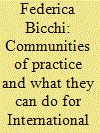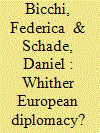|
|
|
Sort Order |
|
|
|
Items / Page
|
|
|
|
|
|
|
| Srl | Item |
| 1 |
ID:
183700


|
|
|
|
|
| Summary/Abstract |
This article argues that communities of practice (CoPs) provide IR with a unique way to understand how a small group of committed people can make a difference to international politics. The point is addressed in three steps. First, the article advances our understanding of how CoPs work. While at its core a CoP is a group of people brought together by a practice they enjoy, a CoP also shares a sense of timing, placing, and humour. These aspects help the group anchor, refine, and innovate their practice in the face of challenges and uncertainty. Second, the article contrasts the analysis of CoPs with other IR approaches, especially institutional analysis, network analysis, and epistemic communities, to show how CoPs supplement them. Third, the article illustrates the argument with the example of the EU foreign policy towards the Israeli-Palestinian conflict. It concludes by suggesting that a CoP's perspective not only helps IR better understand informal politics, but also opens up conversations across disciplines.
|
|
|
|
|
|
|
|
|
|
|
|
|
|
|
|
| 2 |
ID:
184038


|
|
|
|
|
| Summary/Abstract |
The article analyses the evolution of European diplomacy over two decades, to assess the impact of the European External Action Service (EEAS) creation alongside consecutive waves of enlargement. Data is drawn from two original datasets about European Union (EU) member states’ diplomatic representations within the EU and across the globe. It shows that member states have maintained and strengthened their substantial diplomatic footprint across the EU’s territory, expanding it to include new members and making Brussels a diplomatic hub also for non-member countries. In parallel, and despite the establishment of the EEAS, member states have maintained and even increased their networks of diplomatic representations across the globe, alongside more numerous and more politically active EU Delegations (EUDs). At the same time, member states have been reducing their diplomats’ numbers, as the cases of Austria, France, Germany and Italy show. This delicate balancing act has been made possible not only by contemporary technological developments, but also by European cooperation, as in the case of EUDs hosting member states’ representations in non-member countries, a development referred to as co-location. Therefore, whereas the continued presence of national embassies on the ground could be interpreted as detracting from the EEAS, the existence of EUDs contributes also to other, more indirect but certainly novel, forms of diplomatic cooperation under a single European roof.
|
|
|
|
|
|
|
|
|
|
|
|
|
|
|
|
|
|
|
|
|